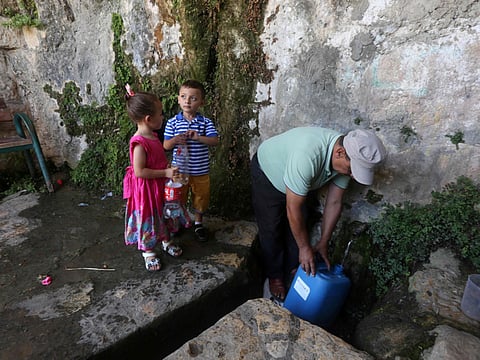Palestinian water taps run dry
Families have been without water for over five days as supply is diverted to Jewish colonies

Salfit: Fatma Ali stands in her small patch of garden in the parched West Bank and wonders how to feed her family of seven when she’s had no water in nearly a week.
“I can’t cook, do the dishes or serve drinks,” she says, surveying the cracked earth and dried-up fountain in her yard in Salfit, north of Ramallah.
Ali is one of tens of thousands of Palestinians in the Israeli-occupied West Bank who have gone without water in recent weeks. She and her family are among some of Salfit’s 15,000 inhabitants who have been without water for five days even as temperatures have topped 40 degrees Celsius.
The town – like nearly all Palestinian towns – gets its water from the mains network of Israel, which has diverted supplies to Jewish colonies in the West Bank while the high temperatures persist, Palestinian authorities say.
“I have grandchildren who can’t shower and who need something to drink,” Ali says.
The shortage is felt all the more by Salfit’s residents as it comes during Ramadan, when families gather each night for the iftar meal at the end of the day’s fast.
In addition to families being unable to clean dishes or wash fruit and vegetables, the shortage is hitting the area’s olive and date trees, which require regular watering.
Although the shortage is recent, the dispute over water has long been one of the main bones of contention in the decades-old Israeli-Palestinian conflict.
“Salfit sits on what have been the largest water reserves in historical Palestine and yet we have nothing to drink because our water is diverted to Israeli colonies,” Mayor Shaher Eshtieh complained.
According to Ewash, a collection of NGOs dealing with water in the Palestinian Territories, each West Bank inhabitant uses 73 litres of water per day.
That’s below the 100-litre level advised by the World Health Organisation and less than a third of the 240 litres used daily by Israelis.
Palestinian authorities accuse Israel of stalling permission to upgrade existing water infrastructure, which they say includes wells and pipes that have not been checked in years.
Saleh Ataneh, head of Salfit’s water department, accused Israel of lying when it said that both communities were affected by cuts.
He said shortages “only affect Palestinian towns and villages”.
Palestinian farmer Zaher Madi said it was having a catastrophic affect on his livestock.
“I need 10 cubic metres a day on my farm. I’ve received 10 cubic metres total in the last four days,” he says, pointing to four buckets holding the remainder of the previous day’s supply.
“Sometimes I am afraid to feed the animals, because I’m scared they will need water afterwards.
“The animals are dead, the cows have had miscarriages, I have lost so much.”
Sign up for the Daily Briefing
Get the latest news and updates straight to your inbox



